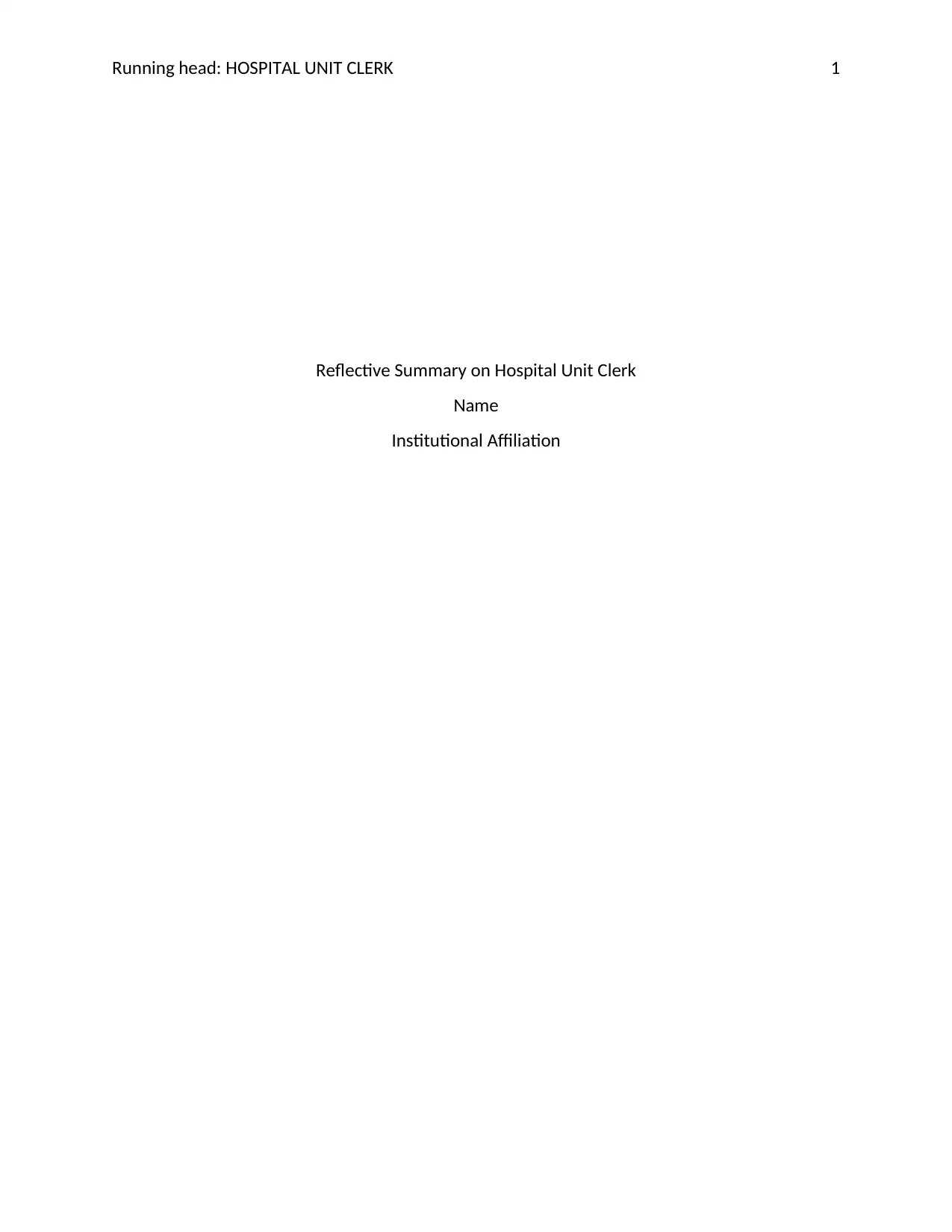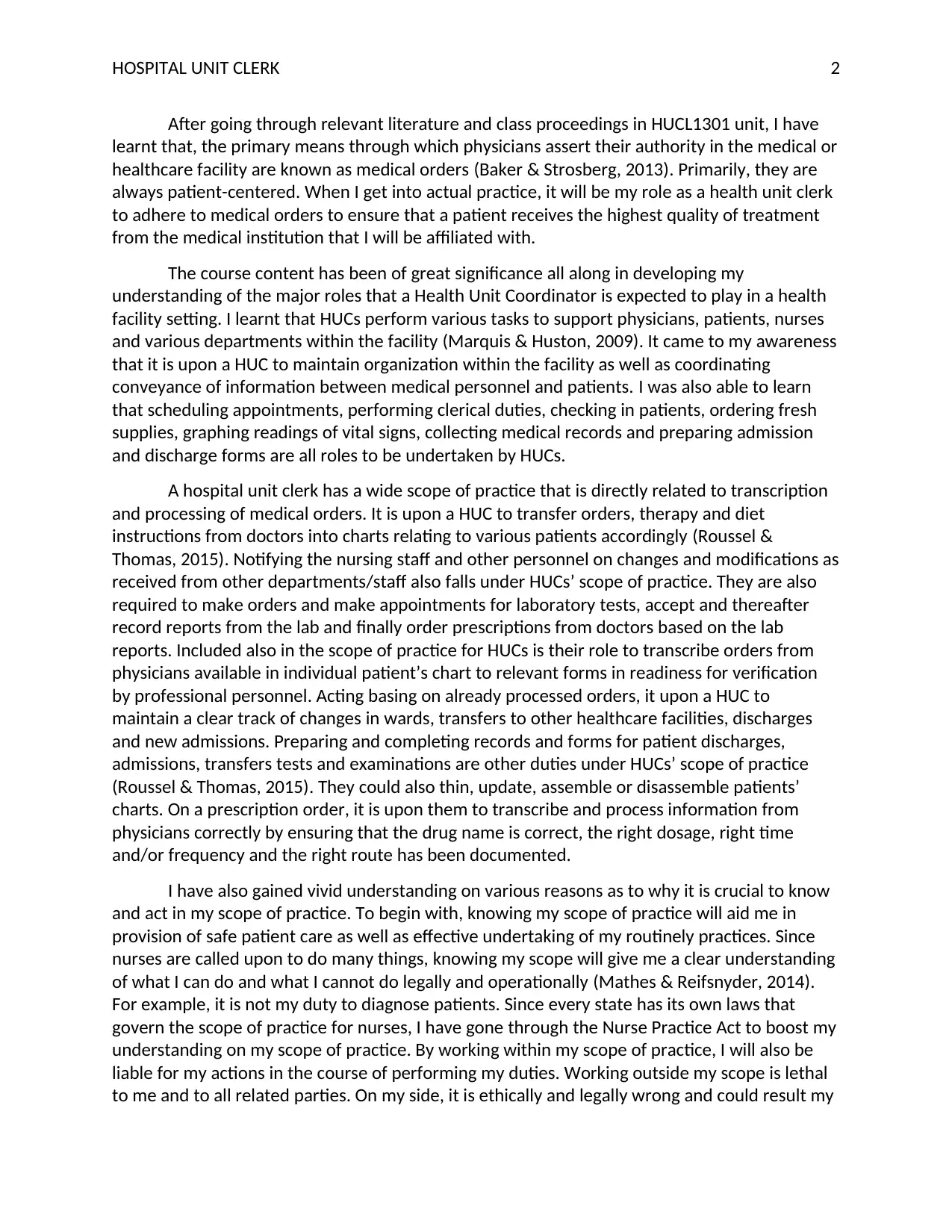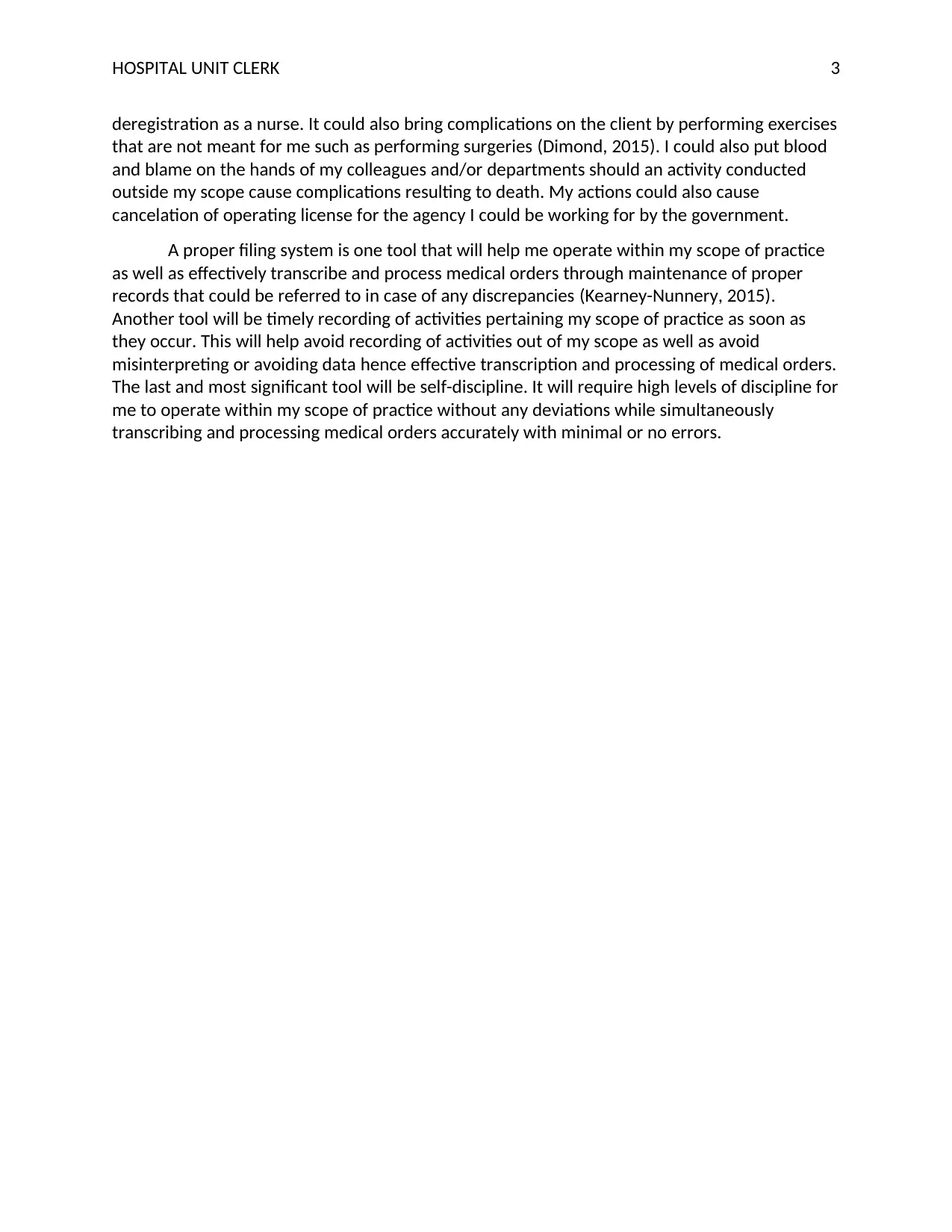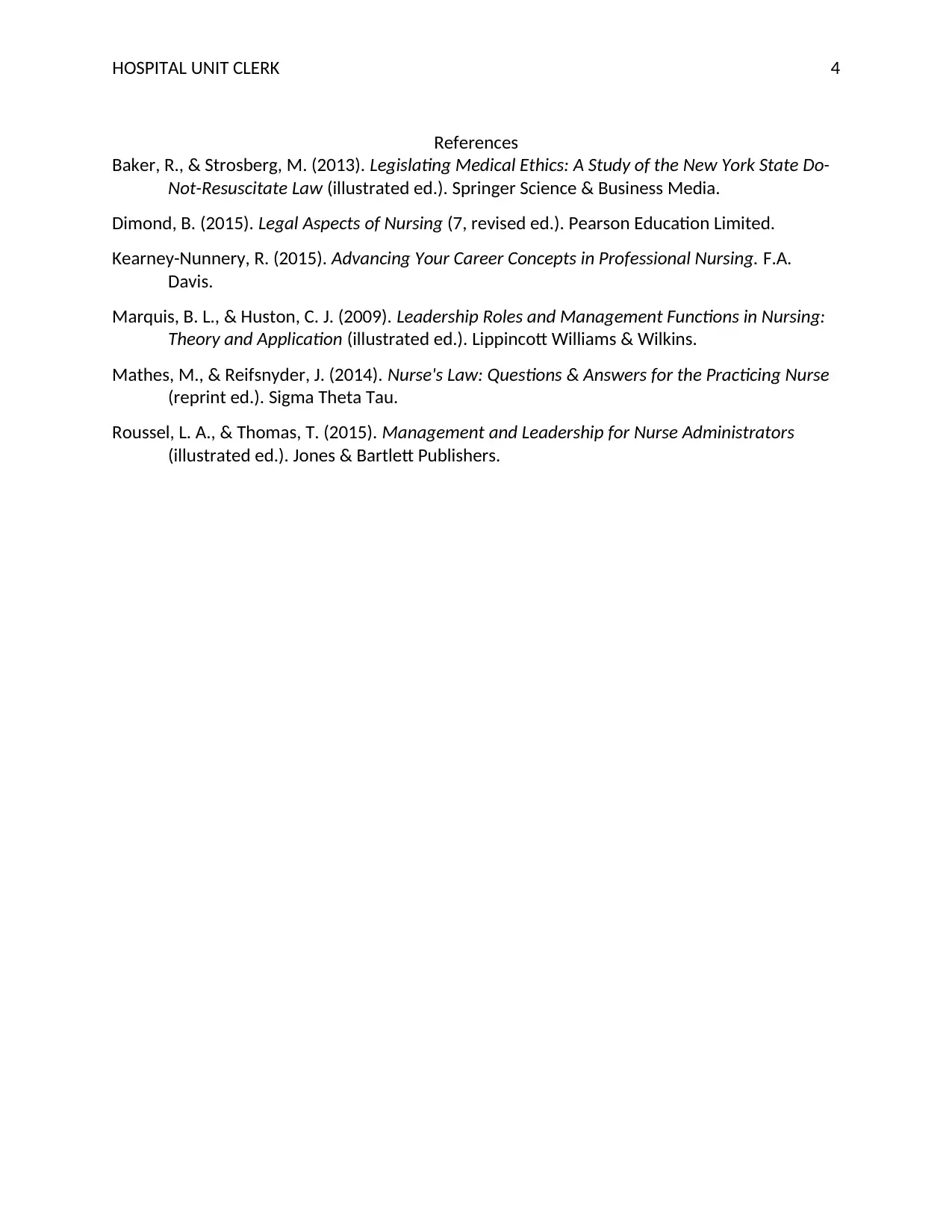HUCL1301 Course: Reflective Summary on Hospital Unit Clerk's Scope
VerifiedAdded on 2023/06/09
|4
|1115
|129
Report
AI Summary
This report provides a reflective summary on the role and scope of practice of a Hospital Unit Clerk (HUC), based on the HUCL1301 course. The author discusses the importance of medical orders, patient-centered care, and the various tasks HUCs perform to support physicians, nurses, and patients. The report covers responsibilities such as scheduling appointments, performing clerical duties, ordering supplies, transcribing medical orders, and maintaining patient records. The author emphasizes the significance of understanding and adhering to the scope of practice to ensure safe patient care and avoid legal and ethical issues. Tools like a proper filing system, timely recording of activities, and self-discipline are highlighted as essential for effectively transcribing and processing medical orders while operating within the HUC’s scope of practice. References to relevant literature and the Nurse Practice Act are also included, providing a comprehensive overview of the HUC role.

Running head: HOSPITAL UNIT CLERK 1
Reflective Summary on Hospital Unit Clerk
Name
Institutional Affiliation
Reflective Summary on Hospital Unit Clerk
Name
Institutional Affiliation
Paraphrase This Document
Need a fresh take? Get an instant paraphrase of this document with our AI Paraphraser

HOSPITAL UNIT CLERK 2
After going through relevant literature and class proceedings in HUCL1301 unit, I have
learnt that, the primary means through which physicians assert their authority in the medical or
healthcare facility are known as medical orders (Baker & Strosberg, 2013). Primarily, they are
always patient-centered. When I get into actual practice, it will be my role as a health unit clerk
to adhere to medical orders to ensure that a patient receives the highest quality of treatment
from the medical institution that I will be affiliated with.
The course content has been of great significance all along in developing my
understanding of the major roles that a Health Unit Coordinator is expected to play in a health
facility setting. I learnt that HUCs perform various tasks to support physicians, patients, nurses
and various departments within the facility (Marquis & Huston, 2009). It came to my awareness
that it is upon a HUC to maintain organization within the facility as well as coordinating
conveyance of information between medical personnel and patients. I was also able to learn
that scheduling appointments, performing clerical duties, checking in patients, ordering fresh
supplies, graphing readings of vital signs, collecting medical records and preparing admission
and discharge forms are all roles to be undertaken by HUCs.
A hospital unit clerk has a wide scope of practice that is directly related to transcription
and processing of medical orders. It is upon a HUC to transfer orders, therapy and diet
instructions from doctors into charts relating to various patients accordingly (Roussel &
Thomas, 2015). Notifying the nursing staff and other personnel on changes and modifications as
received from other departments/staff also falls under HUCs’ scope of practice. They are also
required to make orders and make appointments for laboratory tests, accept and thereafter
record reports from the lab and finally order prescriptions from doctors based on the lab
reports. Included also in the scope of practice for HUCs is their role to transcribe orders from
physicians available in individual patient’s chart to relevant forms in readiness for verification
by professional personnel. Acting basing on already processed orders, it upon a HUC to
maintain a clear track of changes in wards, transfers to other healthcare facilities, discharges
and new admissions. Preparing and completing records and forms for patient discharges,
admissions, transfers tests and examinations are other duties under HUCs’ scope of practice
(Roussel & Thomas, 2015). They could also thin, update, assemble or disassemble patients’
charts. On a prescription order, it is upon them to transcribe and process information from
physicians correctly by ensuring that the drug name is correct, the right dosage, right time
and/or frequency and the right route has been documented.
I have also gained vivid understanding on various reasons as to why it is crucial to know
and act in my scope of practice. To begin with, knowing my scope of practice will aid me in
provision of safe patient care as well as effective undertaking of my routinely practices. Since
nurses are called upon to do many things, knowing my scope will give me a clear understanding
of what I can do and what I cannot do legally and operationally (Mathes & Reifsnyder, 2014).
For example, it is not my duty to diagnose patients. Since every state has its own laws that
govern the scope of practice for nurses, I have gone through the Nurse Practice Act to boost my
understanding on my scope of practice. By working within my scope of practice, I will also be
liable for my actions in the course of performing my duties. Working outside my scope is lethal
to me and to all related parties. On my side, it is ethically and legally wrong and could result my
After going through relevant literature and class proceedings in HUCL1301 unit, I have
learnt that, the primary means through which physicians assert their authority in the medical or
healthcare facility are known as medical orders (Baker & Strosberg, 2013). Primarily, they are
always patient-centered. When I get into actual practice, it will be my role as a health unit clerk
to adhere to medical orders to ensure that a patient receives the highest quality of treatment
from the medical institution that I will be affiliated with.
The course content has been of great significance all along in developing my
understanding of the major roles that a Health Unit Coordinator is expected to play in a health
facility setting. I learnt that HUCs perform various tasks to support physicians, patients, nurses
and various departments within the facility (Marquis & Huston, 2009). It came to my awareness
that it is upon a HUC to maintain organization within the facility as well as coordinating
conveyance of information between medical personnel and patients. I was also able to learn
that scheduling appointments, performing clerical duties, checking in patients, ordering fresh
supplies, graphing readings of vital signs, collecting medical records and preparing admission
and discharge forms are all roles to be undertaken by HUCs.
A hospital unit clerk has a wide scope of practice that is directly related to transcription
and processing of medical orders. It is upon a HUC to transfer orders, therapy and diet
instructions from doctors into charts relating to various patients accordingly (Roussel &
Thomas, 2015). Notifying the nursing staff and other personnel on changes and modifications as
received from other departments/staff also falls under HUCs’ scope of practice. They are also
required to make orders and make appointments for laboratory tests, accept and thereafter
record reports from the lab and finally order prescriptions from doctors based on the lab
reports. Included also in the scope of practice for HUCs is their role to transcribe orders from
physicians available in individual patient’s chart to relevant forms in readiness for verification
by professional personnel. Acting basing on already processed orders, it upon a HUC to
maintain a clear track of changes in wards, transfers to other healthcare facilities, discharges
and new admissions. Preparing and completing records and forms for patient discharges,
admissions, transfers tests and examinations are other duties under HUCs’ scope of practice
(Roussel & Thomas, 2015). They could also thin, update, assemble or disassemble patients’
charts. On a prescription order, it is upon them to transcribe and process information from
physicians correctly by ensuring that the drug name is correct, the right dosage, right time
and/or frequency and the right route has been documented.
I have also gained vivid understanding on various reasons as to why it is crucial to know
and act in my scope of practice. To begin with, knowing my scope of practice will aid me in
provision of safe patient care as well as effective undertaking of my routinely practices. Since
nurses are called upon to do many things, knowing my scope will give me a clear understanding
of what I can do and what I cannot do legally and operationally (Mathes & Reifsnyder, 2014).
For example, it is not my duty to diagnose patients. Since every state has its own laws that
govern the scope of practice for nurses, I have gone through the Nurse Practice Act to boost my
understanding on my scope of practice. By working within my scope of practice, I will also be
liable for my actions in the course of performing my duties. Working outside my scope is lethal
to me and to all related parties. On my side, it is ethically and legally wrong and could result my

HOSPITAL UNIT CLERK 3
deregistration as a nurse. It could also bring complications on the client by performing exercises
that are not meant for me such as performing surgeries (Dimond, 2015). I could also put blood
and blame on the hands of my colleagues and/or departments should an activity conducted
outside my scope cause complications resulting to death. My actions could also cause
cancelation of operating license for the agency I could be working for by the government.
A proper filing system is one tool that will help me operate within my scope of practice
as well as effectively transcribe and process medical orders through maintenance of proper
records that could be referred to in case of any discrepancies (Kearney-Nunnery, 2015).
Another tool will be timely recording of activities pertaining my scope of practice as soon as
they occur. This will help avoid recording of activities out of my scope as well as avoid
misinterpreting or avoiding data hence effective transcription and processing of medical orders.
The last and most significant tool will be self-discipline. It will require high levels of discipline for
me to operate within my scope of practice without any deviations while simultaneously
transcribing and processing medical orders accurately with minimal or no errors.
deregistration as a nurse. It could also bring complications on the client by performing exercises
that are not meant for me such as performing surgeries (Dimond, 2015). I could also put blood
and blame on the hands of my colleagues and/or departments should an activity conducted
outside my scope cause complications resulting to death. My actions could also cause
cancelation of operating license for the agency I could be working for by the government.
A proper filing system is one tool that will help me operate within my scope of practice
as well as effectively transcribe and process medical orders through maintenance of proper
records that could be referred to in case of any discrepancies (Kearney-Nunnery, 2015).
Another tool will be timely recording of activities pertaining my scope of practice as soon as
they occur. This will help avoid recording of activities out of my scope as well as avoid
misinterpreting or avoiding data hence effective transcription and processing of medical orders.
The last and most significant tool will be self-discipline. It will require high levels of discipline for
me to operate within my scope of practice without any deviations while simultaneously
transcribing and processing medical orders accurately with minimal or no errors.
⊘ This is a preview!⊘
Do you want full access?
Subscribe today to unlock all pages.

Trusted by 1+ million students worldwide

HOSPITAL UNIT CLERK 4
References
Baker, R., & Strosberg, M. (2013). Legislating Medical Ethics: A Study of the New York State Do-
Not-Resuscitate Law (illustrated ed.). Springer Science & Business Media.
Dimond, B. (2015). Legal Aspects of Nursing (7, revised ed.). Pearson Education Limited.
Kearney-Nunnery, R. (2015). Advancing Your Career Concepts in Professional Nursing. F.A.
Davis.
Marquis, B. L., & Huston, C. J. (2009). Leadership Roles and Management Functions in Nursing:
Theory and Application (illustrated ed.). Lippincott Williams & Wilkins.
Mathes, M., & Reifsnyder, J. (2014). Nurse's Law: Questions & Answers for the Practicing Nurse
(reprint ed.). Sigma Theta Tau.
Roussel, L. A., & Thomas, T. (2015). Management and Leadership for Nurse Administrators
(illustrated ed.). Jones & Bartlett Publishers.
References
Baker, R., & Strosberg, M. (2013). Legislating Medical Ethics: A Study of the New York State Do-
Not-Resuscitate Law (illustrated ed.). Springer Science & Business Media.
Dimond, B. (2015). Legal Aspects of Nursing (7, revised ed.). Pearson Education Limited.
Kearney-Nunnery, R. (2015). Advancing Your Career Concepts in Professional Nursing. F.A.
Davis.
Marquis, B. L., & Huston, C. J. (2009). Leadership Roles and Management Functions in Nursing:
Theory and Application (illustrated ed.). Lippincott Williams & Wilkins.
Mathes, M., & Reifsnyder, J. (2014). Nurse's Law: Questions & Answers for the Practicing Nurse
(reprint ed.). Sigma Theta Tau.
Roussel, L. A., & Thomas, T. (2015). Management and Leadership for Nurse Administrators
(illustrated ed.). Jones & Bartlett Publishers.
1 out of 4
Related Documents
Your All-in-One AI-Powered Toolkit for Academic Success.
+13062052269
info@desklib.com
Available 24*7 on WhatsApp / Email
![[object Object]](/_next/static/media/star-bottom.7253800d.svg)
Unlock your academic potential
Copyright © 2020–2026 A2Z Services. All Rights Reserved. Developed and managed by ZUCOL.





